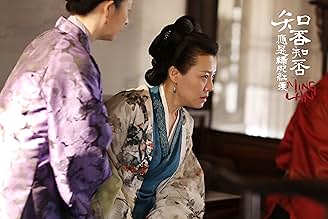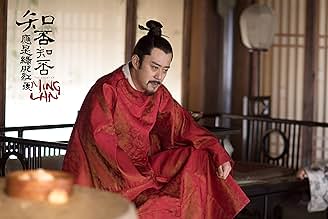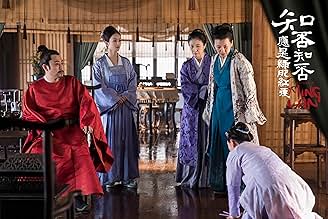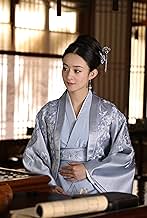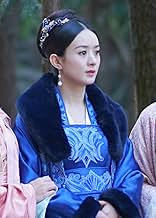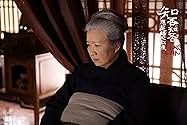Ajouter une intrigue dans votre langueAn unfavoured child of a rich family, Ming Lan studies and works hard, and falls in love with the son of a high official. Through cunning schemes, they both rise in position and work to obta... Tout lireAn unfavoured child of a rich family, Ming Lan studies and works hard, and falls in love with the son of a high official. Through cunning schemes, they both rise in position and work to obtain justice from those that have wronged them.An unfavoured child of a rich family, Ming Lan studies and works hard, and falls in love with the son of a high official. Through cunning schemes, they both rise in position and work to obtain justice from those that have wronged them.
- Récompenses
- 17 victoires et 25 nominations au total
Parcourir les épisodes
Histoire
Commentaire à la une
There are a few flaws to this cdrama that I consider fatal:
1. Generally, if a script has the bad guys outnumber the good guys, there must be some other redemptive quality to the program. I could not find one here, and the never-ending parade of sinister, criminal, and/or heartless characters was overbearing and dreadful and eventually became tedious and uncreative.
2. Unless the protagonist is a comic book superhero, the protagonist should not have an endlessly bountiful supply of skills, strengths, and intelligence. Here, the central character Ming Lan has nearly all talents imaginable (of intelligence, scholarship, bravery, athleticism, and she even deftly uses a sword one time, and she can apparently read all people except - rather absurdly - she can't understand what her husband wants), and the story has her exhibit that abundance of talents in ridiculous and incredible ways - including, for instance, having her instruct trained military men on how to fortify her home against invaders and telling them when to shoot their arrows. Absurd. She is also put in numerous situations where she is advising other characters as if she alone has the intelligence to solve each of their problems, no matter how much more they may know about their circumstances than she possibly can. Again, absurd. It would have been much better for the script to have given her a reasonable and believable amount of strengths and talents, and put her in positions where she combined those strengths and talents with the strengths and talents of others so that, as partners or as a team looking at things from different perspectives, they could solve their problems. But while this occurs a couple of times, it is rarely the case. Instead, there are even situations where she acts alone according to her own stratagems and doesn't even consult her grandmother, who had raised Ming Lan and we are made to believe is a large reason why Ming Lan is so capable and intelligent. This is not a good example of wise or skillful behavior.
3. The script constantly harps on filial affection and duties and respect for elders being prevailing social norms (norms that can even be enforced by law at that time), and it gives its central character Ming Lan an understanding of right and wrong, propriety, etiquette, etc. Yet, despite this, the central character in several situations speaks and acts condescendingly towards elders, including elders in her family and, most prominently, towards her father. The way she manipulates him and talks to him in a patronizing manner when trying to deal with his wife's family is repulsive. And also not believable. For a character who is supposedly so intelligent but also so proper, the scriptwriters should have had her act differently - in a way where she persuaded her father of how to act without being controlling and condescending - or found another way to achieve her ends without being rude and patronizing and thinking that she alone has all the answers. I don't know what lessons we are supposed to draw from this exhibition of poor behavior - particularly, as we generally know that truly intelligent people are modest, have humility, and respect others even when they disagree with them. The ick factor, combined with the unbelievability resulting from the contradictions in the main character's personality, is just a turn-off.
Not to mention the many scenes of whining or fake crying or fake wailing by women (do the scriptwriters hate most women to produce this many horrid images of them?). These scenes quickly become tedious and a nuisance. Also, not to mention the many instances where a dilemma faced by a character is nearly magically solved by the appearance of some savior person, tool, circumstance, etc. That was not hinted at in an earlier part of the script to make it even remotely believable.
For all of the above reasons, I currently hate myself for wasting so much time watching this dreadful show and am beating myself up for having listened to all of the positive reviews out there. This drama is no Nirvana in Fire. Not even close.
1. Generally, if a script has the bad guys outnumber the good guys, there must be some other redemptive quality to the program. I could not find one here, and the never-ending parade of sinister, criminal, and/or heartless characters was overbearing and dreadful and eventually became tedious and uncreative.
2. Unless the protagonist is a comic book superhero, the protagonist should not have an endlessly bountiful supply of skills, strengths, and intelligence. Here, the central character Ming Lan has nearly all talents imaginable (of intelligence, scholarship, bravery, athleticism, and she even deftly uses a sword one time, and she can apparently read all people except - rather absurdly - she can't understand what her husband wants), and the story has her exhibit that abundance of talents in ridiculous and incredible ways - including, for instance, having her instruct trained military men on how to fortify her home against invaders and telling them when to shoot their arrows. Absurd. She is also put in numerous situations where she is advising other characters as if she alone has the intelligence to solve each of their problems, no matter how much more they may know about their circumstances than she possibly can. Again, absurd. It would have been much better for the script to have given her a reasonable and believable amount of strengths and talents, and put her in positions where she combined those strengths and talents with the strengths and talents of others so that, as partners or as a team looking at things from different perspectives, they could solve their problems. But while this occurs a couple of times, it is rarely the case. Instead, there are even situations where she acts alone according to her own stratagems and doesn't even consult her grandmother, who had raised Ming Lan and we are made to believe is a large reason why Ming Lan is so capable and intelligent. This is not a good example of wise or skillful behavior.
3. The script constantly harps on filial affection and duties and respect for elders being prevailing social norms (norms that can even be enforced by law at that time), and it gives its central character Ming Lan an understanding of right and wrong, propriety, etiquette, etc. Yet, despite this, the central character in several situations speaks and acts condescendingly towards elders, including elders in her family and, most prominently, towards her father. The way she manipulates him and talks to him in a patronizing manner when trying to deal with his wife's family is repulsive. And also not believable. For a character who is supposedly so intelligent but also so proper, the scriptwriters should have had her act differently - in a way where she persuaded her father of how to act without being controlling and condescending - or found another way to achieve her ends without being rude and patronizing and thinking that she alone has all the answers. I don't know what lessons we are supposed to draw from this exhibition of poor behavior - particularly, as we generally know that truly intelligent people are modest, have humility, and respect others even when they disagree with them. The ick factor, combined with the unbelievability resulting from the contradictions in the main character's personality, is just a turn-off.
Not to mention the many scenes of whining or fake crying or fake wailing by women (do the scriptwriters hate most women to produce this many horrid images of them?). These scenes quickly become tedious and a nuisance. Also, not to mention the many instances where a dilemma faced by a character is nearly magically solved by the appearance of some savior person, tool, circumstance, etc. That was not hinted at in an earlier part of the script to make it even remotely believable.
For all of the above reasons, I currently hate myself for wasting so much time watching this dreadful show and am beating myself up for having listened to all of the positive reviews out there. This drama is no Nirvana in Fire. Not even close.
Meilleurs choix
Connectez-vous pour évaluer et suivre la liste de favoris afin de recevoir des recommandations personnalisées
- How many seasons does The Story of Ming Lan have?Alimenté par Alexa
Détails
- Date de sortie
- Pays d’origine
- Sites officiels
- Langue
- Aussi connu sous le nom de
- The Story of Ming Lan
- Voir plus de crédits d'entreprise sur IMDbPro
- Couleur
Contribuer à cette page
Suggérer une modification ou ajouter du contenu manquant

Lacune principale
By what name was Zhi fou zhi fou ying shi lü fei hong shou (2018) officially released in India in English?
Répondre
